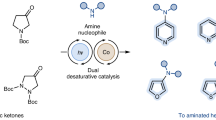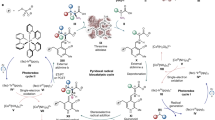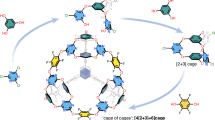Abstract
A rapid and efficient microwave-assisted solid-phase synthesis method for the preparation of a nonapeptide using conventional Fmoc/But orthogonal protection strategy is described. In this protocol, the coupling steps are performed within 5 min at 60 °C and the Fmoc-deprotection steps are completed within 3 min at 60 °C using a dedicated single-mode microwave peptide synthesizer utilizing temperature-controlled conditions. It is demonstrated that the model nonapeptide (containing the calmodulin-binding octapeptide sequence) is synthesized in a shorter time (∼3.5 h) and with high purity (>95%) under microwave irradiation conditions in comparison with a reference peptide that is obtained by standard methods at room temperature (within 11 h).
This is a preview of subscription content, access via your institution
Access options
Subscribe to this journal
Receive 12 print issues and online access
$259.00 per year
only $21.58 per issue
Buy this article
- Purchase on Springer Link
- Instant access to full article PDF
Prices may be subject to local taxes which are calculated during checkout





Similar content being viewed by others
References
Marx, V. Watching peptide drugs grow up. Chem. Eng. News 83, 17–24 (2004).
Pichereau, C. & Allary, C. Therapeutic peptides under the spotlight. Euro. Biopharm. Rev. (WINTER), 88–93 (2005).
Chan, W.C. & White, P.D. Fmoc Solid Phase Peptide Synthesis (Oxford University Press, Oxford, 2000).
Hodge, P. Polymer-supported organic reactions: what takes places in the beads? Chem. Soc. Rev. 26, 417–424 (1997).
Günther, W., Matthias, U. & Birgitt, S. Medicinal chemistry: challenges and opportunities. Angew. Chem. Int. Ed. 40, 3341–3350 (2001).
Tam, J.P. & Lu, Y.-A. Coupling difficulty associated with interchain clustering and phase-transition in solid-phase peptide synthesis. J. Am. Chem. Soc. 117, 12058–12063 (1995).
Hyde, C., Johnson, T., Owen, D., Quibell, M. & Sheppard, R.C. Some 'difficult sequences' made easy: a study of interchain association in solid-phase peptide synthesis. Int. J. Peptide Protein Res. 43, 431–440 (1994).
Kappe, C.O. Controlled microwave heating in modern organic synthesis. Angew. Chem. Int. Ed. 43, 6250–6284 (2004).
Kappe, C.O. & Stadler, A. Microwaves in Organic and Medicinal Chemistry (Wiley-VCH, Weinheim, Germany, 2005).
Loupy, A. (ed.) Microwaves in Organic Synthesis 2nd edn. (Wiley-VCH, Weinheim, Germany, 2006).
Kappe, C.O. & Dallinger, D. The impact of microwave synthesis on drug discovery. Nat. Rev. Drug Discov. 5, 51–64 (2006).
Yu, H.M., Chen, S.-T. & Wang, K.T. Enhanced coupling efficiency in solid phase peptide synthesis by microwave irradiation. J. Org. Chem. 57, 4781–4784 (1992).
Erdelyi, M. & Gogoll, A. Rapid microwave-assisted solid-phase peptide synthesis. Synthesis 11, 1592–1596 (2002).
Matsushita, T., Hinou, H., Kurogochi, M., Shimizu, H. & Nishimura, S.I. Rapid microwave-assisted solid-phase glycopeptide synthesis. Org. Lett. 7, 877–880 (2005).
Brandt, M., Gammeltoft, S. & Jensen, K.J. Microwave heating for solid-phase peptide synthesis: general evaluation and application to 15-mer phosphopeptides. Int. J. Pept. Prot. Res. 12, 349–357 (2006).
Gorske, B.C., Jewell, S.A., Guerard, E.J. & Blackwell, H.E. Expedient synthesis and design strategies for new peptoid construction. Org. Lett. 7, 1521–1524 (2005).
Olivos, H.J., Alluri, P.G., Reddy, M.M., Salony, D. & Kodadek, T. Microwave-assisted solid-phase synthesis of peptoids. Org. Lett. 4, 4057–4059 (2002).
Fara, M.A., Díaz-Mochón, H.J. & Bradley, M. Microwave-assisted coupling with DIC/HOBt for the synthesis of difficult peptoids and fluorescently labelled peptides—a gentle heat goes a long way. Tetrahedron Lett. 47, 1011–1014 (2006).
Murray, J.K. & Gellman, S.H. Application of microwave irradiation to the synthesis of 14-helical β-peptides. Org. Lett. 7, 1517–1520 (2005).
Murray, J.K. et al. Efficient synthesis of a β-peptide combinatorial library with microwave irradiation. J. Am. Chem. Soc. 127, 13271–13280 (2005).
Murray, J.K. & Gellman, S.H. Microwave-assisted parallel synthesis of a 14-helical β-peptide library. J. Comb. Chem. 8, 58–65 (2006).
Murray, J.K. & Gellman, S.H. Parallel synthesis of peptide libraries using microwave irradiation. Nat. Protoc. 2, 624–631 (2007).
Collins, J.M. & Collins, M.J. Microwave-enhanced solid-phase peptide synthesis. in Microwaves in Organic Synthesis 2nd edn. (ed. Loupy, A.) 898–958 (Wiley-VCH, Weinheim, Germany, 2006).
Palasek, S.A., Cox, Z.J. & Collins, J.M. Limiting racemization and aspartimide formation in microwave-enhanced Fmoc solid phase peptide synthesis. J. Pept. Sci. 13, 143–148 (2007).
Collins, J.M. & Leadbeater, N.E. Microwave energy: a versatile tool for the biosciences. Org. Biomol. Chem. 5, 1141–1150 (2007).
Rizzolo, F., Sabatino, G., Chelli, M., Rovero, P. & Papini, A.M. A convenient microwave-enhanced solid-phase synthesis of difficult peptide sequence: case study of Gramicidin A and CSF114(Glc). Int. J. Pept. Res. Ther. 13, 203–208 (2007).
Bacsa, B., Desai, B., Dibo, G. & Kappe, C.O. Rapid solid-phase peptide synthesis using thermal and controlled microwave irradiation. J. Pept. Sci. 12, 633–638 (2006).
Nevalainen, L.T. et al. Characterization of novel calmodulin-binding peptides with distinct inhibitory effects on calmodulin-dependent enzymes. Biochem. J. 321, 107–115 (1997).
Acknowledgements
We thank piCHEM R&D for access to the HPLC, lyophilizer and MALDI-TOF MS.
Author information
Authors and Affiliations
Corresponding author
Ethics declarations
Competing interests
The authors declare no competing financial interests.
Rights and permissions
About this article
Cite this article
Bacsa, B., Kappe, C. Rapid solid-phase synthesis of a calmodulin-binding peptide using controlled microwave irradiation. Nat Protoc 2, 2222–2227 (2007). https://doi.org/10.1038/nprot.2007.300
Published:
Issue Date:
DOI: https://doi.org/10.1038/nprot.2007.300
This article is cited by
-
Synthetic strategies for polypeptides and proteins by chemical ligation
Amino Acids (2015)
-
Use of Proteomics and Peptidomics Methods in Food Bioactive Peptide Science and Engineering
Food Engineering Reviews (2012)
-
Synthesis of alkyl- and aryl-amino-substituted anthraquinone derivatives by microwave-assisted copper(0)-catalyzed Ullmann coupling reactions
Nature Protocols (2010)
-
Microwave-assisted synthesis of triple-helical, collagen-mimetic lipopeptides
Nature Protocols (2010)
-
A rapid and efficient route to benzazole heterocycles
Nature Protocols (2010)
Comments
By submitting a comment you agree to abide by our Terms and Community Guidelines. If you find something abusive or that does not comply with our terms or guidelines please flag it as inappropriate.



